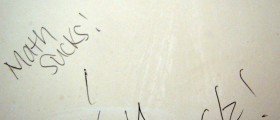
Many people, when talking about dyslexia, define it as a reading disorder or an inability to read and write properly. However, numerous factors stand behind dyslexia and, in order to even discuss about finding a cure, we must at least take them into concern.
Reading disorder is connected to other failures and “short circuits” in the brain of a person suffering from dyslexia. Poor listening skills, inability to follow rhythm and differentiate notes and tones along with scarce motor skills considering arm and leg movement are only some of the underlying “companions” of dyslexia. Dyslexics are known to, while reading, use different parts of brain than people not suffering from this disorder. That being said, clearly there are some reading habits fossilized into the brain of a dyslexic person since the day he or she started learning reading and writing skills, maybe even basic motor skills.
It is thought that this disorder can be cured exactly by removing those side causes and that even there is a possibility that, by removing one cause another may disappear on its own.
One has to bear in the mind that, especially at older age, solving this problem will take a significant amount of time and effort, and that it can be measured in months, even years.
First thing that must be mended are motor skills. There are various methods such as the Dore Achievement Programme, which help in developing motor skills and improving coordination between the brain and the hands of a dyslexic. Again, it may take more time than expected, but one needs to be very persistent if he or she is to cure him or herself.
Before trying to read correctly, and after completing these motor exercises and improved these skills, a dyslexic needs to move on a more difficult task which is developing phonological and phonetic skills. This involves separating homophones, homographs, using stress and pitch in a language and recognizing different types of it. Learning how to sing and follow rhythm patterns is known to be very useful at this stage, since, through relaxing and fun experience a dyslexic, besides boosting his or hers confidence, also learns to differentiates notes and learns how to read “by ear”.
Once this step has been complete, reading and writing comes to the scene. Usually, after developing all the above mentioned exercises and using different programmes for reading and writing acquisition, it should not be too hard to fully banish dyslexia from one's life. Again, all it takes is persistence, will and acknowledgment that the fight can last for years, but the outcome is more than worth it.

















Your thoughts on this
Loading...